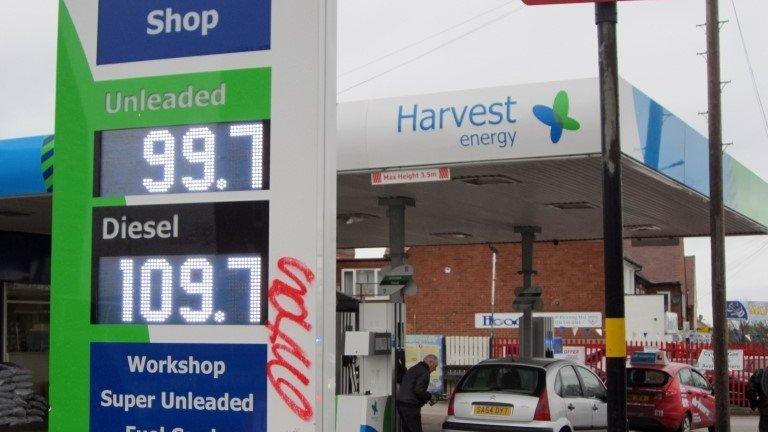Downbeat drumbeats for upstream
- Published
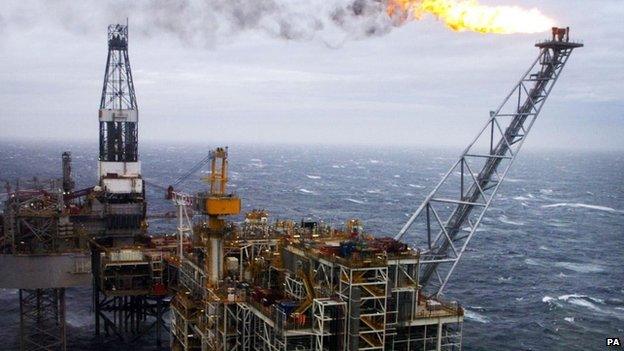
Hundreds of workers are employed offshore in the North Sea
If you want a barrel of Brent crude for delivery next month (an idea for the birthday boy/girl who has everything), it'll currently set you back just under $48. Three days ago, it was nearly three dollars cheaper.
Convert that into the Britisher pound sterling, and it's not far over the £30 mark.
As I've noted before, that price happens to be the cost per barrel above which 19 fields were operating in the UK sector of the North Sea in 2013.
Options to sell oil at $20, or £13.20 are not just being traded, but doing quite a brisk trade. We're told that 13 million barrels have already been covered by such financial instruments, which is a bet on the price continuing to fall.
And now, the oil-covered chickens are flying home to roost, or to get decontaminated.
BP is expected on Thursday to announce a big job cull to its support roles around the world - including an expected 300 North Sea jobs.
As previewed late last year, this is partly to adjust to the shrunken state of the London-based giant, since responding to its Gulf of Mexico disaster and debacle with a big downsizing. Since the review began, it has also taken the falling price into its calculations, so the job cuts may not look pretty.
BP has cut back on its assets in British waters, focussing on areas of strength and clusters of fields where there are long-term plans in place, including initiatives west of Shetland.
Boom times
On Wednesday morning, a smaller operator - Premier Oil - set out its response to the falling oil price, with a cut to its capital spend this year from $1bn to $600m. It is also taking a $300m hit to its asset valuation because of the cuts.
Some of that spending cut is from re-negotiating supplier contracts, as with Edinburgh-based Cairn Energy, which put out a trading statement focussing on its west African offshore prospects.
It made no mention of its very expensive (and controversial) drilling programme off the west of Greenland. Cairn has cut its directly-employed staff by more than a third, though these are much smaller numbers than BP.
How many people work for BP?
-
84,000 - In 80 countries
-
15,000 - UK-wide
-
3,500 - Scotland
-
600 - On North Sea platforms
Tullow Oil, London-based with a focus on Africa and Norway, has today announced a $600m reduction in asset values due to the price fall. It's slashing its exploration budget, with substantial cost cuts on the way.
This is an industry where suppliers and individual freelance contracts benefit from rapid price inflation in the boom times, but suffer sharp cost cuts in the bad times.
That's why Wood Group, among others, simply lopped 10% off its contractor payments last month.
Of course, that feeds through to the spending power of those workers, who could be found living and spending big money across Scotland and beyond. They're important to some remote communities as much as the oil and gas heartlands of Aberdeen city and shire.
Plugged and abandoned
What, then, of this broader economic impact?
There's a lot of analysis coming in these days. Wood Mackenzie, the energy analyst and consultancy based in Edinburgh, has been rather busy.
As I wrote in recent days, its analysis of 2,222 oil fields around the world suggests that a $50 barrel means 190,000 barrels per day become cash negative, with the UK and US having most of them.
It went on to say that at the $45 level, 400,000 barrels per day become cash negative, and half of those can be found in the USA.
WoodMac has since published a study estimating a low price puts at risk $3.2bn of potential spending on projects which are yet to get a green light in UK upstream (exploration and production, before the hydrocarbons get to a refinery, downstream). That's £2bn of difference.
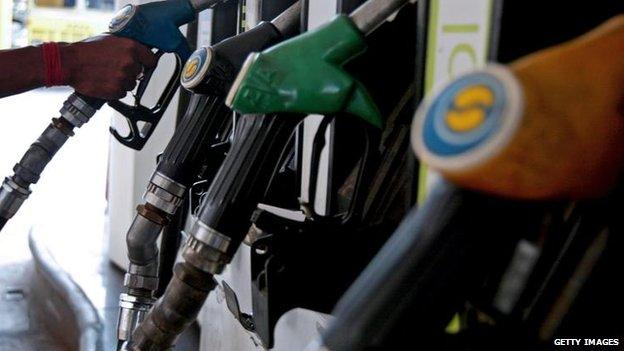
Car drivers have seen cheaper prices at the fuel pumps over the last few months
After another strong year of investment in 2014 - at £12bn, it's not far off the 2013 record - such a cut would take investment next year to £6.3bn - just over half of the 2014 level. It adds that, with production costs very high in the UK North Sea, there's the potential for "shut-in" - plugging and abandoning wells.
Fergus Ewing, the Scottish government's energy minister, was on BBC Radio Scotland, adding to that worry, with a warning that tax cuts and tax breaks have to be brought forward from George Osborne's budget this year, because without them, crucial decisions on shut-ins will be made before then.
Exploration to replace depleting UK reserves has been at a low level, says WoodMac. Last year saw only 23 exploration wells drilled, while the recent average has been 81.
"The current oil price means 2015 will unsurprisingly bring further budget cuts - with exploration spend top of the list," observes WoodMac analyst Erin Moffat.
Deal-making down
A further WoodMac report out this week points to difficulties in the Norwegian sector of the North Sea, extending north to the Barents. Our Norwegian neighbours have been seen as having a better run of discoveries and luck recently.
BBC Scotland's Gillian Marles: "It is hardly unexpected that companies are going to have to reassess plans."
And while the Edinburgh analysts say there was much good news for Norway's oil industry last year, they also suggest drilling results in 2014 were "lacklustre", and that the oil price fall will result in a 25% drop in capital expenditure, to $22bn.
The analysis keeps coming. Deloitte has just published its assessment of the industry in north-west Europe.
It reported drilling down, and the number of field start-ups in the UK sector down from 13 in 2013 to only six last year.
Deal-making has also stalled, it says. Assets are on the market, but the smaller companies which are likely buyers of mature fields, from which they believe more can be squeezed, are not finding finance easy, so the market is stalling.
That could be eased with lower prices meaning lower asset values, and more attractive pricing.
Refined
Yet another take on it comes my way from Platts, an industry data specialist. It's been looking at the effect of future prices being up to a dollar a barrel higher for future delivery than immediate, meaning there's an incentive to store oil.
On-land storage is very high in Europe, and the cost of remaining capacity is high. Platts reports that up to 22 very large crude oil tankers are currently being used to store oil in south-east Asia, rather than transporting it, and they say that can cost up to $65,000 per day for a ship.
There remains capacity for refined oil product, so refineries are keeping busy as they fill the on-shore tanks they've got.
The over-supply looks particularly bad through next month, particularly in West Africa, which is a key indicator that prices are going to stay low for a few weeks yet, at least.
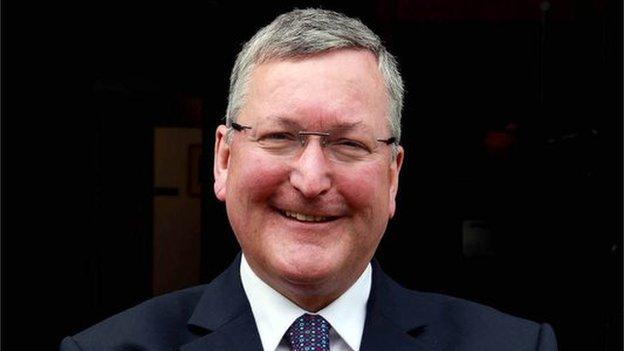
Scotland's Energy Minister Fergus Ewing says tax cuts and tax breaks have to be brought forward now
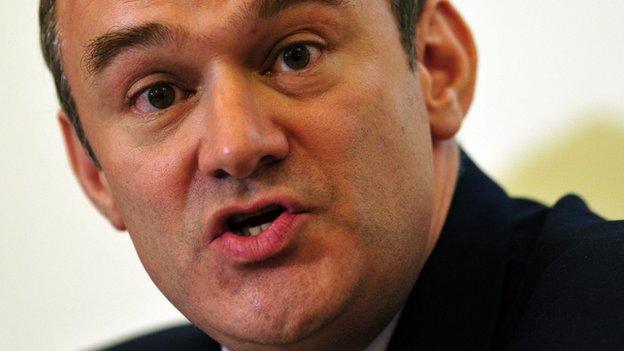
UK Energy Secretary Ed Davey has acknowledged the tax regime in the North Sea may need to change
But let's not forget the upside. Oxford Economics, yet another consultancy, has run the figures on the global economy.
It reckons that 10 large industrialised economies should gain $440bn lower bills this year for importing energy, which is effectively a direct stimulus to their economies.
At an average $55 price, that helps push growth up from 2.6% to 2.9% during 2015, forecasts Oxford.
For the UK, the revised lift in economic growth is even higher, from 2.6% to 3%.
Mark Carney, governor of the Bank of England, told MPs on Wednesday that the net impact on the British economy should be positive.
He went on to say the net effect on the Scottish economy will be negative, but that fiscal arrangements - handling economic shocks through UK Treasury distributions - should protect Scotland from the effects of that.
It's a more political statement than any he made during the referendum campaign.
- Published15 January 2015
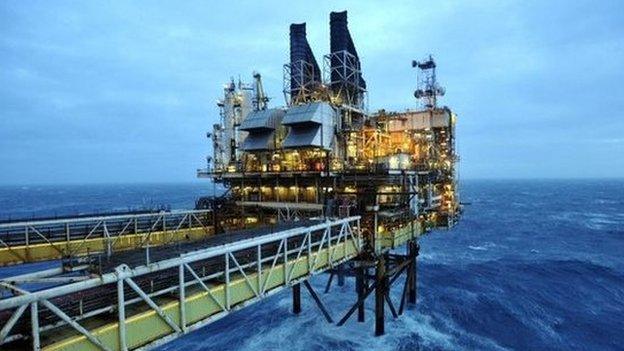
- Published14 January 2015
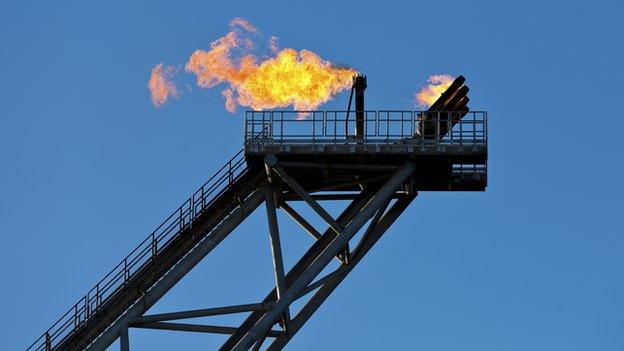
- Published13 January 2015
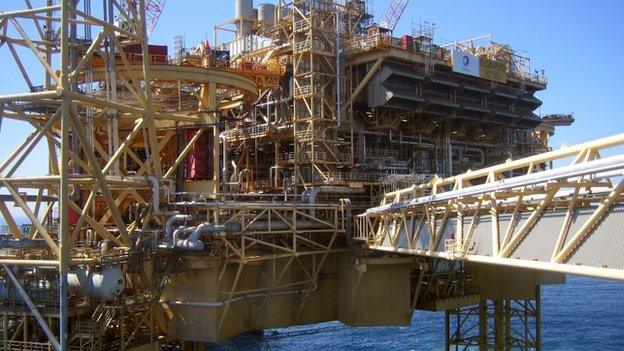
- Published12 January 2015
